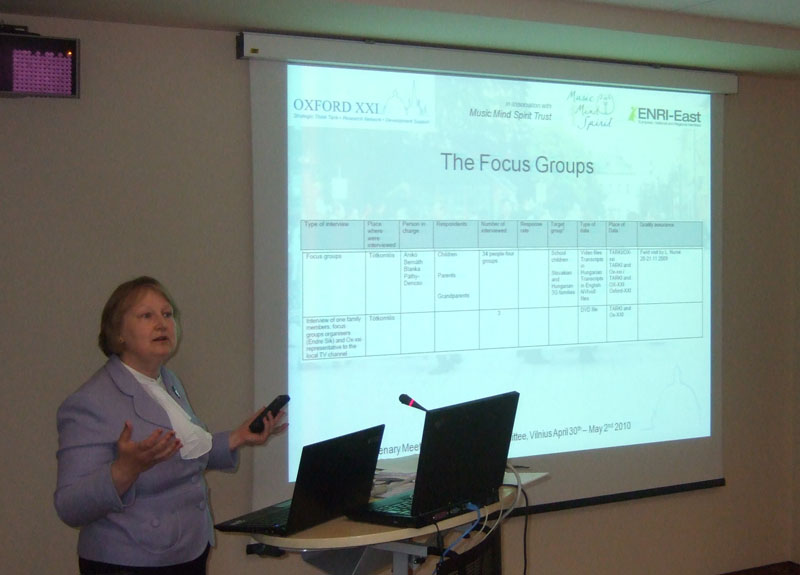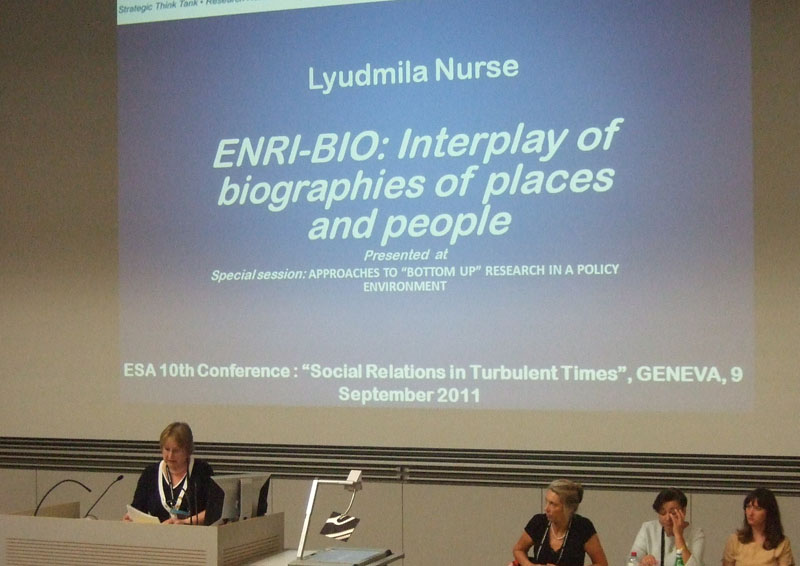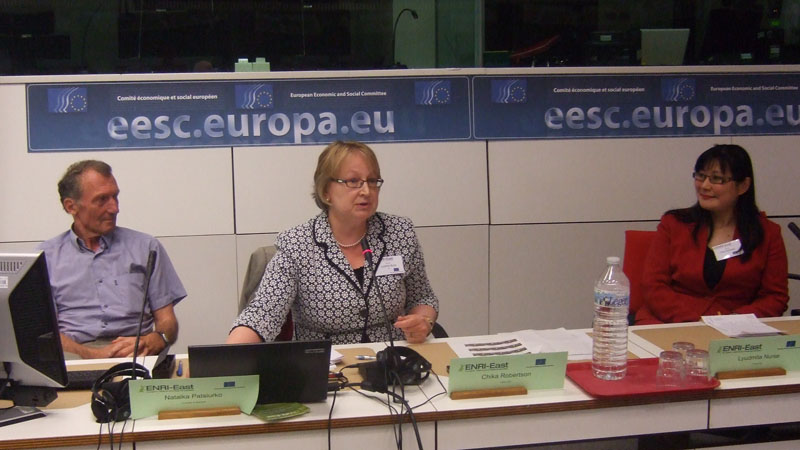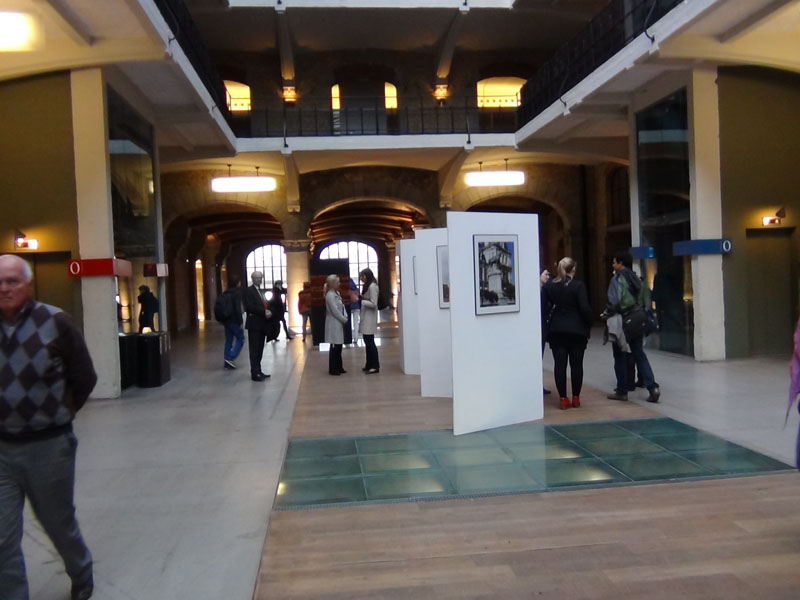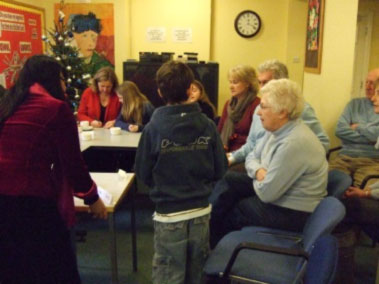
EC FP7 project, 2008-2011. ENRI-EAST: Interplay of European, National and Regional Identities: nations between states along the new eastern borders of the European Union.
Part of the European Commission Seventh Framework Programme Topic SSH-2007-5.2.1 Histories and Identities-articulating national and European identities. Project number 217227.
The main objective of the project was a deeper understanding of the ways in which the modern European identities and regional cultures are formed and inter-communicated in the Eastern part of the European continent with a focus on ethnic minorities in Central East European countries.
http://www.abdn.ac.ukentre/enrieast-pr/socsci/research/new-europe-coject-364.php
Oxford XXI was an institutional partner in the international consortium of 11 Universities and Research institutes from 7 EU member states and 3 neighbouring Eastern European countries which was led by the Institute for Advances Studies, Vienna, Austria. Principal Investigator- Professor H.G Heinrich and Project Coordinator Dr Alexander Chvorostov.
The Oxford XXI team led by Dr Lyudmila Nurse was a lead designer and coordinated Qualitative biographical studies among 12 ethnic minorities in 8 European countries and experts’ interviews of the NGO’s and cultural organisations that represent interest of ethnic minority populations ( stakeholders study), and designed and led “Cultural identities and music” study.
Project’s annual bulletins:
enri_bulletin_issue_1_en_Final
ENRI-EAST Biographical Study
This study provided insights into the meaning systems of self-identified ethnic origin, nationality, citizenship and of belonging.
ENRI-EAST Experts’ interviews
Experts’ interviews provided insight in the ethnic minorities policies in the political context of Central and East European countries
More information can be seen here.
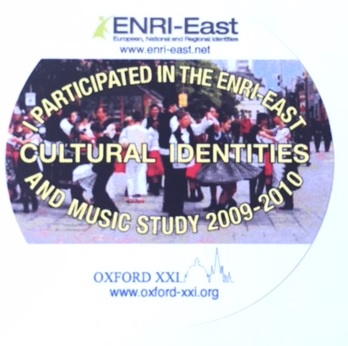
Cultural Identities and Music Study.
The ENRI-East pilot music study analysed cultural identities and self-identification of different ethnic minority individuals in Central East European countries.
Oxford XXI was the Team Leader of the ‘Music and Cultural Identity’ study. This multi-disciplinary, mixed methods study was designed by Dr Lyudmila Nurse in collaboration with Dr Chika Robertson and Professor Paul Robertson of the Music Mind Spirit Trust, UK, and analysed relationship between music and cultural identity. Its initial hypothesis was that, historically, certain folk-inspired classical and traditional music have strong nationalist associations. On the contrary, other musical styles were regarded as international or ‘alien’ and much ‘commercial’ rock and popular music is perceived as more international/global.
Empirical research a combination of quantitative and qualitative methods and focus groups of at least three generations (3G) in the same family of ethnic minority and titular nations individuals was conducted in collaboration with the ENRI-EAST consortium partners in Hungary (Tótkomlós): TARKI (Professor Endre Sik) and Lithuania (Vilnius): Institute for Social Research (ISR), Vilnius (Professor Arvidas Matulionis and Dr Viktorija Žilinskaitė-Vytienė) in 2009-2010. Analysis of the empirical results enabled the research team to identify factors of nationalist/international expression through musical forms, their inter-generational evolution and to provide input to the development of EU cultural and educational policy.
The quantitative survey of musical preferences
In developing the methodology for the quantitative survey, a special module of the ENRI-VIS survey (6,300 respondents in 8 countries), a range of terms that could measure links between music and ethnic self-identification was identified. These included: liking music; musical preference (which for this study is music associated with the country of ethnic minority origin, country of residence, or ‘Global’ music, which was neither related to the country of their ethnic origin nor country of current residence); and music styles (classified through a “bottom up” approach, based on people’s favourite pieces of music.) Furthermore, the ENRI-VIS respondents were asked to indicate to which genres their favourite music belongs, selecting one option out of the list of 10 genres.
Pop music appeared to be a favourite genre of all ethnic minorities studied in the ENRI-East project with the second favourite being folk music; one significant exception to this is the ethnic Slovak minority in Hungary. But while these two genres are balanced among Poles in Lithuania, popular music is preferred significantly in the other three cases, especially among ethnic Russians in Latvia and in Lithuania. Meanwhile, Slovaks in Hungary prefer light music (musicals) notably more than the other ethnic minorities.
Analysis of the clear musical preferences that only relate to ethnic minorities, the ethnic minorities’ countries of residence, or Global music, demonstrates considerable differences between the ethnic minorities. Overall, what is convincingly clear from our analysis is that dynamics of place and identity interact significantly with musical preferences. In particular, the inter-generational perspective of our study invoked additional layers of “identity” that are not detectable by conventional sociological methods.
For more information, please click on the links below:

European Identity: Europeans’ biographical experiences and images of the present day Europe – a component of the EC Culture programme funded project: United States of Europe: a travelling exhibition about European identity and today’s Europe (2011-2013).
Contracted by the Goethe-Institut e.V Paris and directed by Johanna Suo, the EC Culture Programme funded project, “United States of Europe” exhibition provided a virtual platform for European artists and citizens for their interpretations of European identity. The project’s sociological study was led by Lyudmila Nurse. The interactive multi-media laboratory was designed by Jānis Garančs.
Lyudmila Nurse and the Oxford XXI team provided conceptual design for the biographical interview methodology (in collaboration with Professor Andrzej Piotrowski and Dr Tomasz Ferenc, University of Lodz, Poland) and manuals for the interviews for the international team of researchers. Biographical study comprised video-recorded interviews of 50 respondents from ten European countries: Bulgaria, Belgium, Cyprus, Finland, France, Germany, Ireland, Lithuania, Poland, and Portugal.
Lyudmila Nurse coordinated subsequent analysis of biographical narratives and visual data. The interviews were both biographical and structured in order to generate comparable results from a range of groups, including people well-known by the public (politicians, philosophers, and authors), people living in rural areas, young people who have encountered Europe as immigrants or through programmes such as Erasmus or other cultural exchanges and artists presenting their works at the exhibition.
http://www.go-use.eu/en/studies
More information is available here: http://www.go-use.eu/en/about-u-s-e/presentation.html

…The Soundbites project enabled young people to learn about their cultural roots by interviewing their older family members and friends.
Chances4Change programme, 2008-2011. Sound Bites: Health and Wellbeing through Musical Memories. Director- Dr Chika Robertson.
Dr Lyudmila Nurse- qualitative evaluator, case studies designer.
Sound Bites was a pioneering arts and health project for “building” bridges between generations, and promoting community cohesion. The Sound Bites study explored cross-generational and cross-cultural links between musical memories and identities and their impact on families’ life-styles and wellbeing. The key research methods were qualitative and quantitative 3G (three-generational) interviews and focus groups about the biographical aspects of people’s lives and types of preferred music and musical memories. The study was conducted in three schools in three diverse areas of Surrey.
This approach was inspired by the work of Dr Chika Robertson in her SongTrees project, which included interviews conducted by school children to record their parents’ and grandparents’ earliest musical memories, and in Dr Lyudmila Nurse’s inter-generational and biographical studies.
Oxford XXI team created a database derived from 101 ‘3G’ (three-generational) questionnaires. 49 schoolchildren were interviewed in classrooms in three schools in Surrey. Interviewing of the children and briefing on how to interview their families were conducted by Dr Lyudmila Nurse and Tom Houston. A special on-line system was designed by Tom Houston at Oxford XXI to interview schoolchildren in their classrooms. (A similar system was also used in the on-line interviews in Hungary and Lithuania, part of the ENRI-EAST “Cultural identities and music study”). Dr Lyudmila Nurse designed and conducted focus groups with the families and provided analysis for three case studies by participating schools and a comparative analysis of the of the programme’s project impact on families’ and children wellbeing and community cohesion.
More information is available at:


